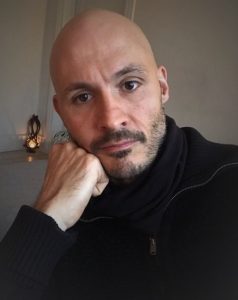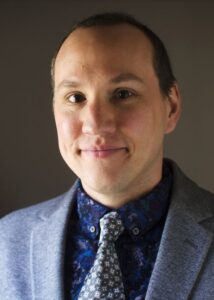Research director Alison Abritis earned her Ph.D. in Public Health, with a concentration in toxicology and risk assessment. Her dissertation focused on retractions and corrections, or the lack thereof, arising from misconduct findings by the Office of Research Integrity (ORI). She found that less than half of the findings resulted in a published retraction or correction, and even fewer had the misconduct indicated as cause for the published notice. To learn more about Alison, follow her on Twitter (@AlisonAbritis) or send her an email at [email protected].
Editor Frederik Joelving worked for more than a decade as a health reporter and editor for Reuters, first on staff in New York and later remotely from Denmark and India. His freelance stories, many of them investigating corruption in the health care industry, have appeared in The New York Times, The BMJ, Slate, VICE News, MedPage Today and elsewhere. He came to Retraction Watch from Medicinske Tidsskrifter, a Danish media company, where he was a managing editor. Before becoming a journalist, he worked briefly as a high school teacher and a ghostwriter for a drug company. He has an M.S. in biology from the University of Copenhagen and an M.A. in journalism from the Science, Health and Environmental Reporting Program at New York University. He lives in Copenhagen and can be reached at fcjoelving at gmail dot com.

Editor Ellie Kincaid (@ellie_kincaid on Twitter) came to Retraction Watch from WebMD, where she edited consumer health news and wrote and edited enterprise stories for healthcare professionals reading Medscape. She previously covered the business of healthcare and biotech at Forbes, and interned with the health & science team at the Wall Street Journal. She’s interested in the ethics of turning medical records into big data, increasing private equity activity in healthcare, and redemption stories. She earned her BA in English, with minors in writing and biology, from Washington University in St. Louis, and her MA in journalism from New York University’s Science, Health, and Environmental Reporting program. She can be reached at [email protected].
Associate researcher Gordon Sullivan comes from a career teaching academic writing and research to undergraduates, where he emphasized the process behind peer-reviewed publications. He earned a PhD in English with a concentration in film studies, and his research focuses on genre cinema, political philosophy, and questions of categorization. His work has appeared in New Review of Film and Television Studies, Film-Philosophy, and Paradoxa.
Here’s more about our co-founders, Adam Marcus and Ivan Oransky.
Former editor Alison McCook came to us after working with both Adam and Ivan over the years, including as Ivan’s deputy at The Scientist. She took over his role there when he left in 2008. After The Scientist, she did stints at Nature in the Features and Comment section, where she edited a piece on reproducibility that was the first to report that the vast majority of landmark papers in preclinical cancer research were not reproducible, sparking much discussion since. Ever since her first full-time science writing gig as a staff writer at Reuters Health, Alison has been interested in the complexities of running a lab, and how no story is ever black and white — especially in the case of fraud.
Former staff writer Victoria Stern first began working with editor Alison McCook at The Scientist in 2009. Since then, she went on to develop a freelance career, working for Medscape, Scientific American Mind (where she became a contributing editor), General Surgery News, and Reuters Health. She studied chemistry at Swarthmore College and science writing at New York University.
Cat Ferguson was Retraction Watch’s first intern — and was our first staff writer. She came to us from the University of California, Santa Cruz’s Science Communication Program and had already written for the New Yorker online, and for New Scientist, among other outlets. She’s now a reporter at BuzzFeed. To learn more about Cat, check out her website.
Former staff writer Shannon Palus has written for Discover, Slate, The Atlantic, and a host of other publications. She has a B.Sc. in physics, with a minor in anthropology, from McGill, where she worked at The McGill Daily. Since graduating, she’s worked as an intern at Idaho National Lab and as a fact-checker for publications including Popular Science.
Former staff writer Dalmeet Singh Chawla has been freelancing since June 2014, focusing on innovations in scholarly publishing, along with peer review, authorship and publisher policies. His work has appeared in Nature, Science, The Economist, The Sunday Times, New Scientist, The Observer, Times Higher Education, The Scientist and more. In September 2015, he was shortlisted for the ‘Outstanding Young Journalist’ Award, which is part of the Asian Media Awards 2015 (hosted by ITV), for his freelance reporting. He has a BSc degree in biochemistry from University College London, and an MSc in Science Communication from Imperial College London.
Former staff writer Andrew P. Han came to Retraction Watch and the Center for Scientific Integrity from GenomeWeb, where he covered the explosion of CRISPR/Cas9 into the research and biotech scene over the last two and a half years. He has also freelanced for Wired.com, Popular Mechanics.com, Newsweek, and Food & Wine. Andy studied astronomy and the history of science at Dartmouth College and science journalism at New York University.



Alison, you are doing a great job !
90% of labs appear to be fudge factories and predatory journals are profitting off of this.
Wonderful job!! Please keep this going on. The young generation of Scientists is greatly suffering and so the society.
How does this fit in your model?
https://www.nslj.org/a-message-to-our-readers/
cheers, working at a university in China I find your site extraordinarily interesting…
Your recent hire, Alison, has been my friend and neighbor for 20 years. She’s among my favorite human beings, and kudos to you for landing her. I’m a counseling graduate student, and had not yet heard of your website, which I see as a must for anyone whose practice/business depends upon being informed by valid and reliable research.
Is there a plan to have some kind of common e-mail to send any tips about retractions?
Thanks for your question — we do plan on creating an email for retraction tips, but in the meantime it works to post a comment on our “meet the staff” page, as you did, or contact our researcher at: aabritis [at] gmail [dot] com. Thanks!
PhD students at Harvard reports misconduct, PI from Harvard Stem Cell Institute gets him hospitalized based on fabricated allegations of insanity
https://www.socialaw.com/services/slip-opinions/slip-opinion-details/gustavo-german-plaintiff-vs.-david-lopes-cardozo-and-lee-l.-rubin-defendants
This is my first time to come across retractionwatch.com and it is a dream come true for me, a prayer answered! I have seen so much fraud and lack of integrity in my academic and research life, I was about to give up altogether. I’ve glanced though the various links and found quite a number of situations that resonate with my varied experiences, most of which have been in my country of origin – Kenya! I’m sure to have more to say later after reading some more. Thank you.
Thanks
Please discuss about the rules of self-retraction by the honest authors. Is there any guideline in this regard?
Is self-retraction in subjects of penalty or stigma? What is the rule of COPE in the self-retraction?
Best
Hi, In an comment or paper to be submitted to an academic journal, how should we cite information summarized from this website or data summarized from the retraction watch database? I am looking at the number of duplications in two fields. Thank you.
Thanks for the question. It’s probably best to check the journal’s style guide, but here are a number of examples of how we’ve been cited in the literature. If you’re looking for the number of retractions for duplication in two fields, we’d suggest using our database, rather than the blog. And feel free to contact us at [email protected] to help using it.
If you haven’t seen it yet, Dr. Kreipke’s group has earned another retraction, this time for double-publishing the same data in two different papers:
https://www.sciencedirect.com/science/article/pii/S0006899309003692?showall%3Dtrue%26via%3Dihub
Thanks, that’s already in our database, the best place to check: http://retractiondatabase.org/RetractionSearch.aspx?AspxAutoDetectCookieSupport=1#?AspxAutoDetectCookieSupport%3d1%26auth%3dChristian%2bW%2bKreipke
Thank you. I didn’t know about that.
Dear Retraction Watch staff,
You are doing a great great great job!
You are in the front line of a long and ferocious battle against all kinds of research malpractices. The good news is that many people are becoming aware of the importance of Research Integrity and the work you are doing.
I would like to follow all the activities of retarctionwatch. is there a way I could register myself?
Please advise.
Regards,
Ismail
Thanks for the kind words. You can sign up for our emails by following the directions at the bottom of each post, or following them here: http://retractionwatch.com/2018/02/25/retraction-watch-is-back-at-full-speed-heres-what-you-need-to-do-to-make-sure-youre-seeing-our-content/
Started life as a scientist….research went away locally in 1979. You can find a glimmer of it by putting ( “Darl DeVault” chimps ) into Google Search Bar and hitting enter.
Found your “Wow” site today.
Please accept the following as a suggested phrase you may want to expand and include when interacting directly with non-compliant retraction folks to alert them to how they look to the rest of us:
Alexander Solzhenitsyn writes in The Gulag Archipelago:
“To do evil a human being must first of all believe that what he’s doing is good, or else that it’s a well-considered act in conformity with natural law.”
Skipped four sentences of quote with too much detail…..have to know Shakespeare.
Quote picks up again in next graph.
He writes further about the role of Ideology: “That is what gives evildoing its long-sought justification and gives the evildoer the necessary steadfastness and determination. That is the social theory which helps to make his acts seem good instead of bad in his own and other’s eyes, so that he won’t hear reproaches and curses but will receive praise and honors.”
Again, Wow, what a site. Keep up the good work
It is really shocking to see that more than 200 COVID articles get retracted in last 2 yrs.
I generally share your efforts in my presentations to make aware the researchers.
Thank you for your genuine efforts to the knowledge society.
Regards and best wishes
Dr Sushil Kumar
Welcome Ellie! Best of wishes. Your interest in the ethics (and the practices and accuracy of) turning medical records into big data will be an important area of inquiry. Happy Digging!
good job
Thank you for this site and your work. Do you have plans to take it over to Mastodon?
(Apologies of you have, and I’ve missed it)
The team at Retraction Blog are my heroes! I began my dissertation process seven years ago at a prominent university. It took me a while to understand what I was reading during my lit review. There are so many studies in the literature that don’t belong. Almost none are reproducible. Almost all include caveats that the studies have severe limitations that, if you read them correctly, the limitations all but remove any claims to accuracy and validity. I blame the dissertation committees charged with churning out as many grads as possible and the journals that profit from these “articles.”
Maybe just maybe, your blog will give everyone involved in the process pause, and the result will be a better body of knowledge.
While I think you are doing a great service for science, I was wondering if you had ever thought about a publication or website named “Replication Watch”, where replication studies are posted. Replication is an important part of the scientific ecosystem, as you know, but it is not rewarded. There are many non-PhD schools (The CUs has 23 in CA) whose faculty have publishing requirements, and this kind of effort might reward those who contact replication studies.
Just a thought.
You are doing very respected work which is highly critical to science
Thanks for your efforts
If you want a classic example of self-citation read:Peters MA. Knowledge socialism: The rise of peer production–collegiality, collaboration, and collective intelligence. In From radical Marxism to knowledge socialism 2021 Dec 22 (pp. 193-205). Routledge. https://doi.org/10.1080/00131857.2019.1654375.
Of 37 references, 28 are the authors works.